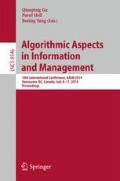Abstract
Minimum Common String Partition (MCSP) has drawn a lot of attention due to its application in genome rearrangement. The best approximation algorithm has a factor O(lognlog* n) and it was shown most recently that it is FPT (but with a very high running time). In this paper, we consider the decision version of the one-sided MCSP problem (formally called the exact block cover problem); namely, when one sequence is already partitioned into k blocks, how to decide whether the other sequence can be partitioned accordingly. While this decision problem is obviously in FPT, we show interesting results in this paper: (1) If each letter is allowed to appear at most twice (or three times), then the problem is polynomially solvable, (2) There is an FPT algorithm which runs in O *(2k) time, improving the trivial bound of O *(k!), and (3) If |Σ| = c, c being a constant at least 2, then the problem is NP-complete.
Access this chapter
Tax calculation will be finalised at checkout
Purchases are for personal use only
Preview
Unable to display preview. Download preview PDF.
References
Bulteau, L., Fertin, G., Komusiewicz, C., Rusu, I.: A fixed-parameter algorithm for minimum common string partition with few duplications. In: Darling, A., Stoye, J. (eds.) WABI 2013. LNCS, vol. 8126, pp. 244–258. Springer, Heidelberg (2013)
Bulteau, L., Komusiewicz, C.: Minimum common string partition parameterized by partition size is fixed-parameter tractable. ArXiv: CoRR abs/1305.0649 (2013)
Chen, X., Zheng, J., Fu, Z., Nan, P., Zhong, Y., Lonardi, S., Jiang, T.: Computing the assignment of orthologous genes via genome rearrangement. In: Proc. APBC 2005, pp. 363–378 (2005)
Chrobak, M., Kolman, P., Sgall, J.: The greedy algorithm for the minimum common string partition problem. In: Jansen, K., Khanna, S., Rolim, J.D.P., Ron, D. (eds.) APPROX and RANDOM 2004. LNCS, vol. 3122, pp. 84–95. Springer, Heidelberg (2004)
Cormode, G., Muthukrishnan, S.: The string edit distance matching problem with moves. In: Proceedings of the 13th ACM-SIAM Symp. on Discrete Algorithms (SODA 2002), pp. 667–676 (2002)
Damaschke, P.: Minimum Common String Partition Parameterized. In: Crandall, K.A., Lagergren, J. (eds.) WABI 2008. LNCS (LNBI), vol. 5251, pp. 87–98. Springer, Heidelberg (2008)
Downey, R., Fellows, M.: Parameterized Complexity. Springer (1999)
Flum, J., Grohe, M.: Parameterized Complexity Theory. Springer (2006)
Fu, B., Jiang, H., Yang, B., Zhu, B.: Exponential and polynomial time algorithms for the minimum common string partition problem. In: Wang, W., Zhu, X., Du, D.-Z. (eds.) COCOA 2011. LNCS, vol. 6831, pp. 299–310. Springer, Heidelberg (2011)
Garey, M.R., Johnson, D.S.: Computers and Intractability: A Guide to the Theory of NP-Completeness. W.H. Freeman (1979)
Goldstein, A., Kolman, P., Zheng, J.: Minimum common string partition problem: Hardness and approximations. In: Fleischer, R., Trippen, G. (eds.) ISAAC 2004. LNCS, vol. 3341, pp. 484–495. Springer, Heidelberg (2004); Also in: The Electronic Journal of Combinatorics 12, paper R50 (2005)
Jiang, H., Zhu, B., Zhu, D., Zhu, H.: Minimum common string partition revisited. J. of Combinatorial Optimization 23(4), 519–527 (2012)
Kaplan, H., Shafrir, N.: The greedy algorithm for edit distance with moves. Inf. Process. Lett. 97(1), 23–27 (2006)
Kolman, P., Waleń, T.: Reversal Distance for Strings with Duplicates: Linear Time Approximation Using Hitting Set. In: Erlebach, T., Kaklamanis, C. (eds.) WAOA 2006. LNCS, vol. 4368, pp. 279–289. Springer, Heidelberg (2007)
Kolman, P.: Approximating reversal distance for strings with bounded number of duplicates. In: Jedrzejowicz, J., Szepietowski, A. (eds.) MFCS 2005. LNCS, vol. 3618, pp. 580–590. Springer, Heidelberg (2005)
Kolman, P., Walen, T.: Approximating reversal distance for strings with bounded number of duplicates. Discrete Applied Mathematics 155(3), 327–336 (2007)
Author information
Authors and Affiliations
Editor information
Editors and Affiliations
Rights and permissions
Copyright information
© 2014 Springer International Publishing Switzerland
About this paper
Cite this paper
Jiang, H., Su, B., Xiao, M., Xu, Y., Zhong, F., Zhu, B. (2014). On the Exact Block Cover Problem. In: Gu, Q., Hell, P., Yang, B. (eds) Algorithmic Aspects in Information and Management. AAIM 2014. Lecture Notes in Computer Science, vol 8546. Springer, Cham. https://doi.org/10.1007/978-3-319-07956-1_2
Download citation
DOI: https://doi.org/10.1007/978-3-319-07956-1_2
Publisher Name: Springer, Cham
Print ISBN: 978-3-319-07955-4
Online ISBN: 978-3-319-07956-1
eBook Packages: Computer ScienceComputer Science (R0)

